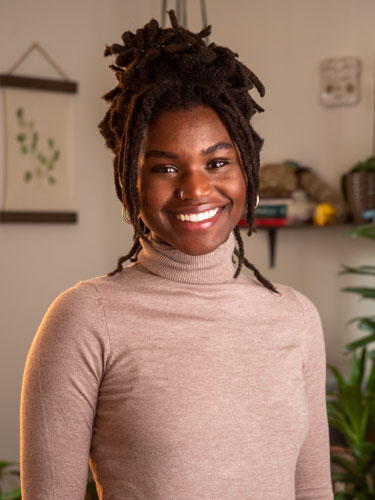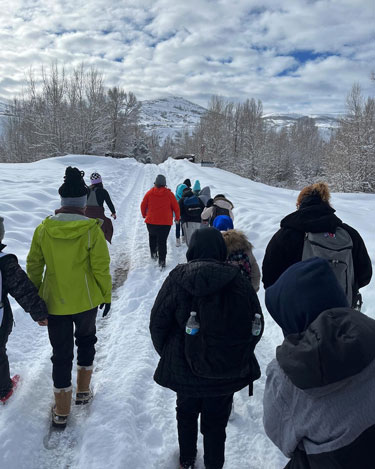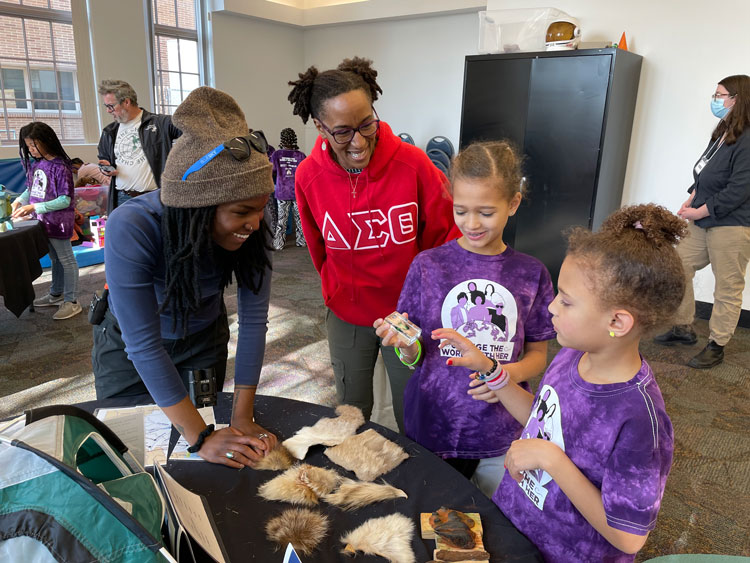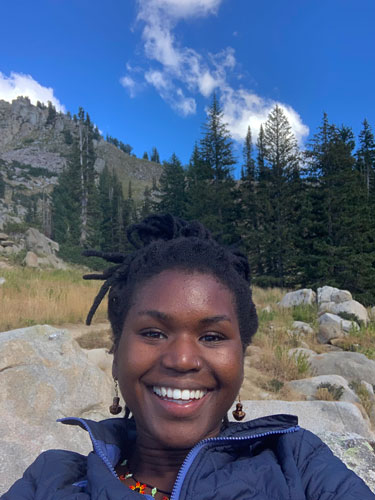Community Engagement Spotlight: Sydney Murray

Sydney Murray is a rising second year student in the Environmental Humanities Program. As a child the outdoors was her playground, and she found herself most comfortable and free under the canopy of the southeastern deciduous forests that made up her home state of Virginia. Sydney also noticed injustices Black people experience in the outdoors, which motivated her to research, work in, and develop outdoor and nature-based education programs for Black youth. Sydney works as a field instructor with Wasatch Mountain Institute, is developing an outdoor education program for Black families in Salt Lake, and this summer is coordinating a critical participatory action research project on Black nature-relatedness in nature-based youth programs in Richmond, Virginia. She has also been active with our campus partners. She led a workshop for youth-in-custody with STEMCAP this spring, and she hosts the Sustain podcast as a graduate assistant for the Sustainability Office.
Sydney graduated from Virginia Commonwealth University with a degree in International Social Justice and minor in Environmental Studies. Throughout her time in the Environmental Humanities Program, Sydney hopes to further unpack the historical and contemporary social-psychological barriers that exclude minority communities from conversations and happenings in the world of outdoor education and recreation.
In April, I interviewed Sydney about her work and research related to outdoor and nature-based education with youth, particularly youth of color, both here in Utah and her home state of Virginia.
Brooke: For the past academic year, you’ve been working with Wasatch Mountain Institute (WMI). What does Wasatch Mountain Institute do and what does your work look like?
Sydney: Wasatch Mountain Institute is a place-based outdoor education organization. It's run by Hilary Lambert, who's a PhD student in the Parks, Rec, and Tourism department. We offer day programs, and we just started our overnight programs this spring. We host our programs at Jordanelle State Park, and we work primarily with fourth through sixth graders. For our day programs, we do field ecology lessons. For the winter months, we teach snow school science. For overnight programs, we also incorporate basic outdoor lessons, like teaching people how to set up camp, how to cook on a camp stove, and how to be safe amongst wildlife. That work has been really fulfilling. It's a nice break from academics to get out of town and immerse myself in these more isolated spaces and remind myself why I wanted to come out to the West and pursue this degree. My passion is all about bringing more people into outdoor spaces, specifically communities that otherwise wouldn't have access, interest in, or knowledge of these spaces or activities. At Wasatch Mountain Institute, we work primarily with Title I schools in the Salt Lake County area, so a lot of Latinx and refugee students. I just think about the look on their faces every time they come out—they’re so full of wonder and excitement. We provide all the gear, which is part of our accessibility initiative to make sure that everybody not only has an opportunity to engage in these spaces, but can also do so comfortably and safely.

Brooke: Your work with Wasatch Mountain Institute has also led to a project specifically for Black families in the community. How did this idea evolve and what’s the vision for the project?
Sydney: I had a class with Hilary Lambert last semester called Facilitating and Managing Outdoor Experiences taught by Jim Sibthorp. For that class, Hilary and I teamed up for our final assignment, which was to design a theory-based program. And then we were like, what if we actually just did this in real life? So that’s what we’re trying to do! The project involves hosting an overnight camping program for Black families of the Salt Lake Valley area at Jordanelle State Park in partnership with WMI; Outdoor Afro-SLC; Ashley Cleveland, who is the former lead volunteer for the local Outdoor Afro chapter; and another organization called Curly Me!, which works with Black girls from ages five to fourteen.
In our research last semester, we looked at engaging with youth from different cultural, racial, and ethnic backgrounds to better understand diverse social-psychological processes of leisure behavior. With Black families in particular, we found that the role of family plays a crucial part in Black youths’ leisure preference development and how frequently they're able to engage with those preferences. So, we're wanting to focus on the sustainability component of engaging more diverse youth participants with nature-based programs by incorporating the value of and input from their families. Through this, we hope that inspiration for nature-relatedness through nature-based programs can blossom beyond this one-time camping experience.

We want to make sure the structure and design of this program has a community-based framework, so input from participants prior to the trip will be taken into consideration. We're trying to be culturally responsive in the design, including the language we use to recruit people and the leadership team, which will be comprised of Black outdoor leaders of the valley. I'm excited about having this element of representation incorporated! I think it will be really good for the youth to see and experience a culturally-relevant Black community experience in the outdoors. We're also tying in a research component with undergraduate students here at the U who are looking at parks and recreation studies, particularly pertaining to diversity, equity, and inclusion.
Brooke: This summer, you’re creating a critical participatory action research investigation of Black nature-relatedness in nature-based youth programs in Richmond, Virginia. What will this research project entail?
Sydney: First, I want to provide some background on the internal motivation that brought me to the Environmental Humanities Program and this research. I was recognizing a general distrust in nature settings within my own family, my social context, and even the broader context of the Black community in the US. That bums me out, because I grew up recreating outside—horseback riding, hiking, and biking—but that wasn't through my family. My family is not outdoorsy. Bugs are gross to them. They'd be like, why would you prefer to sleep on the floor outside rather than in a bed? I was always the oddball in my family and my community. It never made sense to me that I was made fun of for that, because look at all these cool things that I'm experiencing and all the benefits I'm being exposed to psychologically, emotionally, socially. Being outdoors is obviously a good way to spend your time and you learn so much, not just about the world around you, but also about yourself.

I saw this disparity of participation in nature-based recreation and education as an injustice. I was curious about this disparity and understood historically what may have brought this to fruition. We can date this back to slavery and the complex and nuanced ways that experience impacted the relationship between Black people and the environment. But you also can't just rely on that framing, because there are Black people that go outside, so how do we explain that? So, that's the background that prompted my interest in engaging with Black youth specifically. When you're exposed to something when you're younger, you're more familiar and inclined to engage with it later in life, which is the sustainability component. And I love working children.
For this summer’s research project, I will be back home in Richmond. I'm always longing to be back in Richmond, but I am learning so much in this Program and this is my attempt at tying my experience and the knowledge I’m gaining in the Environmental Humanities Program back to my community. I'll be working with a few select nature-based youth serving organizations. This project is going to be conducted under the critical participatory action research framework, or community-based framework where you're challenging traditional methods of research where you go into a community, take information back to your affiliate institution, and don’t follow up with that community. I wanted this project to be something that was not just useful for my academic research, but something that could be useful for the community as well.
In partnership with the selected organizations, I've formed a research team of six individuals, and we will meet monthly over the summer. We're going to be investigating the experiences of Black youth in their programs, and a lot of these programs serve predominantly Black communities. We're investigating Black youth's experiences with how these programs promote or don't promote nature relatedness or a sense of belonging in these spaces. We also hope to draw comparisons or correlations between programs, structures, design, and language on behalf of the organizations. The co-researcher team and I will be coordinating together and collaborating. We'll bring in historical contexts, culturally produced materials like film, music, and literature to situate the problem, potential solutions, what's already working, what's not working, and produce some guidelines of insights gathered from this investigation. I'm excited to hear from the community directly, not just the youth participants, but their parents or guardians as well. We'll be doing qualitative interviews and focus group discussions with guardians and the practitioners to get insight on what they think is working or not working.
Brooke: You recently did a presentation with Maggie Scholle, another rising second year student, for STEMCAP, which works with Youth-in-Custody. What inspired you to present with STEMCAP and bring your environmental education work to this space?
Sydney: I heard about STEMCAP through Dr. Nalini Nadkarni, who I truthfully just idolize. I was introduced to her work through Brett Clark's Foundations class and was so mesmerized by her tree canopy research and her approach to science communication. So I then went to a presentation she gave, and that's where I learned about STEMCAP. I don't have a STEM background at all. That's always been a little bit of an insecurity for me because I've always had a natural affinity towards nature and been very curious about it, but I don't always have the empirical knowledge set or skills to talk about it. I'm working to challenge that internal impostor syndrome, so I decided to apply to lead a STEMCAP workshop. I learned that Maggie Scholle, who's in my cohort, had just done a presentation, and she expressed how fun and exciting the kids were. So, I asked Maggie if she wanted to present together. We presented to a small group of high schoolers about the Great Salt Lake and wove in concepts of environmental justice. We showed a comparison between the history of infrastructure at the Great Salt Lake and the infrastructure of the city. The students were so engaged. They were open to dialogue and asked really good questions. They had a lot of personal stories and experiences that were relevant to the topic. It was cool to see the ways in which they were able to identify in their own ways a lot of the problems that we talk about in this academic space in a sometimes jargony way. It was eye opening and refreshing.
Brooke: What is the value of doing community engagement work while being a student? What are you learning as you use community engaged research methods?
Sydney: I've had beef with academia throughout my entire academic career, yet I'm still here. I feel it's easy to settle into this echo chamber of like-minded people. We all have diverse backgrounds and academic careers that brought us here, but we are all grounded in common values and ideas. It's nice when you are around other people that think like you. It's encouraging, motivating, and affirming. But I think a challenge is taking what you're learning in this academic setting and seeing how it translates to the broader world. Engaging with organizations in the community is a sure way to challenge yourself and not just stay within the academic bubble. On another level, moving out to Utah was really intimidating. For me, it's harder to just go out socially and meet new people randomly. So, engaging with organizations or established entities that align with my interests has been an easier route for me. Through Wasatch Mountain Institute, I've had social opportunities with my co-workers and the people that they interact with.
I think in doing work with historically marginalized communities, one thing that has always felt icky to me is the extractive nature of some research. Last semester in our methods course taught by Angela Robinson, we talked about how research can be extractive and how to avoid it. This semester in Jeff Rose's community engagement class I learned about CPAR (critical participatory action research). That showed ways to make the research process feel better for both the researcher and the community. I also think something you see a lot in marginalized communities is this damage-centered or deficit-based approach to research. So like, this is what this community is without, and this is what we need to do to help them and save them. I think that limits that community and our understanding of their lives outside of the context of the research. I think it also disregards the ways that community members are active participants in shaping their reality. I like the community-based research framework because it redirects research methodologies towards strengths based approach where you're not going in with assumptions or pre-organized theories that you learned from a textbook, but rather going in as a listener and a partner. It's a collaborative process. There's less of a hierarchy so the people that you're engaged with feel like they have control over the study. That feels more reciprocal, feels more honest, feels more respectful. And at the end of the day, students of the EH department want relationships that feel authentic and genuine and as little extractive as possible.
Categories
Featured Posts
Tag Cloud
- community engagement (12)
- outdoor recreation (2)
- outreach (1)
- alumni (3)
- admissions (1)
- faculty (8)
- practitioner-in-residence (2)
- utah award in the environmental humanities (1)
- environmental justice (2)
- STEMCAP (2)
- STEM (2)
- water (1)
- communications (2)
- humanities (1)
- Taft-Nicholson Center (1)
- director (3)
- student (5)
- API (1)
- Asian American (1)
- Pacific Islander (1)
- graduation (1)
- research (3)
- thesis (1)
- project (1)
- Indigenous (1)
- Shoshone (1)
- Great Salt Lake (2)
- Bear River (1)
- land acknowledgement (1)
- STEMAP (1)
- public engagement (1)
- science (1)
- science communication (1)
- Wilkes Center (1)
- climate change (1)
- climate science (1)
- climate policy (1)
- policymaking (1)
- funding (1)
- storytelling (1)
- radio (1)
- journalism (1)
- racial justice (1)
- outdoor education (1)
- writing (1)
- non-fiction (1)
- energy extraction (1)
- queer (1)
- reading (1)
- environmental education (1)
- affect theory (1)
- media (1)
- rhetoric (1)
